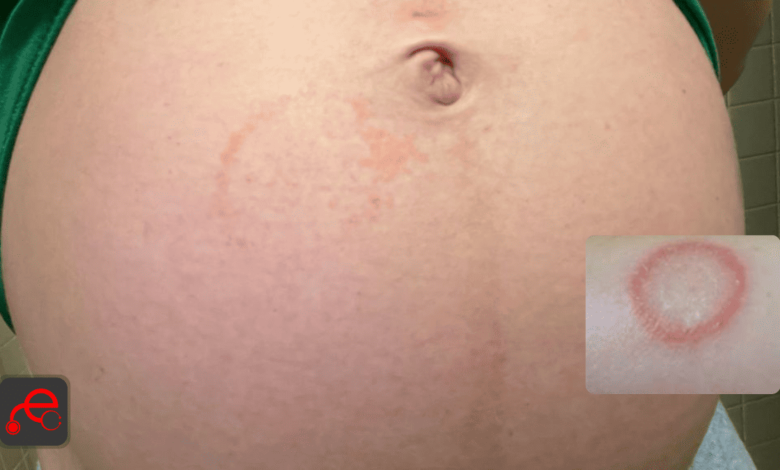Ringworm During Pregnancy: Symptoms, Causes, and Treatment

As there are so many parasites out there, we can easily put all other worms in the category of parasites such as roundworms, tapeworms, hookworms, and whipworms. As the name indicates, however, ringworm is not an actual worm- it is a fungus. Ringworms cause fungal infections, and this infection is common across the world. Therefore, you must be aware of the symptoms, causes, and treatment of ringworm during pregnancy.
Do not worry! You do not know anything about fungal infection. We have got you covered. Let us dig into the details of the fungal infection caused by the ringworms.
It appears as a red blister in the shape of ringworm, it can develop on any part of the body hand, feet, toenails, fingernails, and even scalp.
If you develop this infection, you have to get rid of this as soon as possible to control the spread of the infection to the other parts of the body, it is not only embarrassing but it is highly contagious as well.
Ringworm is not a life-threatening disease, and it can be cured with proper diagnosis and treatment.
Symptoms of Ringworm:
The symptoms of ringworm may differ from person to person and it usually depends upon the location of the affected area and the severity and intensity of the infection.
However, these are the most common symptoms that occur in people who will be affected by ringworms.
The skin may form a distinct circular ring, and the skin will appear red and inflamed with round patches.
In many cases, the round ring-like appearance will have clearance from the center.
- Scaly skin or blisters on the skin
- Itchy skin
- If the ringworm infection has reached the scalp, it will also result in hair loss.
Risks and Effects of Ringworm During Pregnancy:
Many women who want to conceive are highly scared of infecting with contagious fungal diseases. They are scared for their babies as well; they may fear the transmission of the disease from the mother to the child. Mothers are also scared of some serious effects of the ringworms on their fertility and future pregnancy.
Are you worried? Do not worry. We have got you covered with all the risks and effects of ringworms on pregnant women.
Is there any effect of ringworms on pregnancy? However, it is highly unlikely that ringworm will affect your pregnancy or the child. It will not have any negative impact on the pregnancy. However, in some cases, it may affect your pregnancy.
There are some points that you should keep in your mind to eliminate any danger regarding your pregnancy.
- Like any other skin infection, ringworm is highly contagious and it can spread to other parts of the body rapidly. Therefore, pregnant women are at higher risk of getting this fungal infection because of its contagious nature. However, this infection is not life-threatening and it will not have any negative impact on your health or even on your baby’s health.
- During pregnancy, ringworm disease will not cause any harm to the fetus or the unborn babies.
- The fungal specie that is responsible for the ringworm does not infect and goes into the deeper layers of the skin, this fungus solely resides on the dead cells present on the skin, and it feeds completely on the dead skin cells present on the superficial layer of the skin.
- The fungus rarely gets into the deeper layers of the skin. Even though it occurs, this fungus will not be able to survive inside your body and there is no survival rate of this fungus or this infection in the mucus membranes of the body.
Treatment of Ringworm Infection During Pregnancy:
There is no difficulty in treating ringworm infection during pregnancy. It can be easily cured with the help of some lifestyle adaptations and modifications. Doctors usually prescribe some oral medications and topical treatments and if the fungal infection reaches your scalp, doctors prescribe anti-fungal shampoos for the treatment of the infection.
However, a pregnant woman should take her oral medications or even ointments and creams after consulting her doctor because these medications can have negative impacts on the well-being of the unborn baby or the fetus. Apply the topical treatments twice or thrice a week to prevent the outbreak of infection, but always consult a doctor before using any medication because prevention is better than cure.
Home Remedies for Ringworm:
However, various home remedies have been proved beneficial for ringworm disease, and they do not have any adverse effect on the baby and the health of the mother, but to be on the safer side you should always consult your doctor before starting any home remedy.
Using Turmeric:
There is an ingredient present in turmeric called curcumin. It has anti-fungal and anti-inflammatory properties naturally. If you sprinkle the turmeric on the affected area, it will restrict the growth of the ringworm on the affected area, and it will speed up the healing process. You can also apply the paste of turmeric and water to the affected area to get some relief from the inflammation and the itchy feeling. Mix equal parts of turmeric powder and water.
Ginger Tea:
Drinking ginger tea has proven beneficial as well. Ginger is full of antioxidants and it has anti-inflammatory properties. Consuming ginger tea will help you with the symptoms of ringworm. You can also dip a piece of cloth in the ginger tea and apply it to the affected area which will help in soothing the itching and inflammation caused by the infection. Make sure to consume ginger tea in moderation because that will also aggravate the symptoms of heartburn that is very natural during pregnancy.
Massage Coconut Oil:
Coconut oil has anti-microbial and anti-fungal nature that will help you in combating the infection. In addition, coconut oil will help in replenishing the natural moisture of the skin. Massaging coconut oil over the infected area will help in improving blood circulation and that will heal the wound and speed up the recovery time.
Follow these instructions for speedy recovery.
Conclusion
Ringworm during pregnancy is a fungal infection that can affect the skin and nails, causing symptoms such as itching, redness, and flaking. While ringworm is not usually serious, it can be uncomfortable and may cause concern for pregnant women. Treatment options for ringworm during pregnancy may be limited due to the potential risks of medication to the developing fetus.
However, there are some topical antifungal treatments that may be considered safe for use during pregnancy. It is important for pregnant women to consult with their healthcare provider before starting any treatment for ringworm or any other medical condition during pregnancy. Preventive measures such as good hygiene practices, avoiding contact with infected animals or objects, and keeping the skin clean and dry can also help to reduce the risk of ringworm during pregnancy.
FAQs
Q: Can ringworm during pregnancy harm the baby?
A: Ringworm is not known to cause harm to the developing fetus. However, it can cause discomfort and may be a cause for concern for pregnant women.
Q: How is ringworm during pregnancy diagnosed?
A: Ringworm during pregnancy is typically diagnosed through a physical examination of the affected area and a skin culture to confirm the presence of the fungal infection.
Q: What are the treatment options for ringworm during pregnancy?
A: Treatment options for ringworm during pregnancy may be limited due to the potential risks of medication to the developing fetus. However, some topical antifungal treatments may be considered safe for use during pregnancy. It is important for pregnant women to consult with their healthcare provider before starting any treatment for ringworm or any other medical condition during pregnancy.
Q: Can ringworm during pregnancy be prevented?
A: Good hygiene practices, such as washing hands regularly and avoiding contact with infected animals or objects, can help to reduce the risk of ringworm during pregnancy.
Q: Is it safe to use over-the-counter antifungal creams for ringworm during pregnancy?
A: Over-the-counter antifungal creams are not recommended for use during pregnancy as they may pose a risk to the developing fetus. It is important for pregnant women to consult with their healthcare provider before starting any treatment for ringworm or any other medical condition during pregnancy.
Q: Can ringworm during pregnancy be transmitted to the baby during childbirth?
A: Ringworm is not typically transmitted from the mother to the baby during childbirth. However, it is possible for the baby to become infected with ringworm after birth if they come into contact with an infected person or object.
Q: Is it safe to breastfeed if I have ringworm during pregnancy?
A: Yes, it is safe to breastfeed if you have ringworm during pregnancy. However, it is important to practice good hygiene to prevent the spread of the infection to your baby.
Q: How long does it take for ringworm to go away during pregnancy?
A: The duration of ringworm during pregnancy can vary depending on the severity of the infection and the effectiveness of treatment. In some cases, ringworm may go away on its own, while more severe or chronic infections may require medical treatment.
Q: Can ringworm during pregnancy affect the outcome of the pregnancy or the health of the baby?
A: There is no evidence to suggest that ringworm during pregnancy can affect the outcome of the pregnancy or the health of the baby.
Q: Can pets transmit ringworm to pregnant women?
A: Yes, pets such as cats and dogs can transmit ringworm to humans, including pregnant women. It is important to practice good hygiene and avoid contact with infected animals or objects to reduce the risk of infection.
Q: Are there any natural remedies for ringworm during pregnancy?
A: While some natural remedies such as tea tree oil or coconut oil may have antifungal properties, their safety and effectiveness during pregnancy have not been well studied. It is important to consult with a healthcare provider before using any natural remedies for ringworm or any other medical condition during pregnancy.
Q: Can I still go to work if I have ringworm during pregnancy?
A: It is safe to continue working if you have ringworm during pregnancy, as long as you practice good hygiene and take measures to prevent the spread of infection to others.
Q: Can ringworm during pregnancy affect the skin on other parts of the body?
A: Yes, ringworm can affect any part of the body, including the skin, nails, and scalp. It is important to seek treatment for ringworm as soon as possible to prevent the infection from spreading.
Q: What should I do if I suspect I have ringworm during pregnancy?
A: If you suspect you have ringworm during pregnancy, it is important to consult with your healthcare provider. They can provide a diagnosis and recommend appropriate treatment options that are safe for use during pregnancy.


